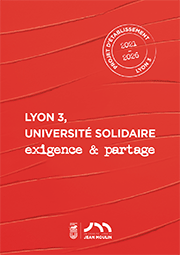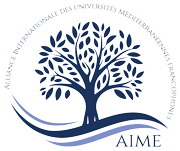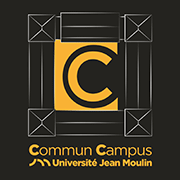AccueilRechercheProgrammes et productions scientifiquesThèsesThèses soutenuesThèses soutenues - 2006-2021Thèses soutenues - 2017
-
Partager cette page
- Recherche,
GODEFROY Bruno
Ordre et temps. Eric Voegelin, Karl L?with et la temporalité du politique
Publié le 11 mai 2017 – Mis à jour le 22 février 2018
Thèse en cotutelle en Philosophie – ?tude des Systèmes, soutenue le 5 mai 2017.
Dans le chapitre du Contrat social consacré à la mort du corps politique, Rousseau rappelle que cette mort est ? la pente naturelle et inévitable des Gouvernements les mieux constitués ?. En effet, poursuit-il, ??si Sparte et Rome ont péri, quel ?tat peut espérer de durer toujours ? Si nous voulons former un établissement durable, ne songeons donc point à le rendre éternel??. Malgré l’avertissement de Rousseau, la tendance à rendre l’ordre politique éternel semble être un phénomène constant, jusqu’à nos jours. En témoigne l’idée d’une ??fin de l’histoire?? résultant de l’alliance du capitalisme et de la démocratie libérale, ou d’un modèle occidental se comprenant comme la réalisation du seul but de l’histoire, à laquelle ne s’opposeraient que des puissances ? retardatrices??. ? travers ces phénomènes se manifeste une ??politique du temps??, un discours de légitimation de l’ordre politique donnant un sens politique à sa dimension temporelle.
Compris de cette manière, le problème que pose la ??politique du temps?? ne peut être abordé par une critique limitée à ses derniers avatars, telle la thèse de la fin de l’histoire. Il est au contraire nécessaire de remonter à la racine du problème, c’est-à-dire à la place qu’occupe cette question au sein du rapport entre temps et politique. Si la politique du temps s’avère aussi tenace, c’est en effet parce qu’elle s’inscrit dans un questionnement intrinsèquement lié à l’ordre politique, confronté à la nécessité d’assurer son ? être-dans-le-temps??. La politique du temps répond à cette nécessité par une politisation du temps et de l’histoire pouvant conduire, dans sa forme extrême, à une éternisation de l’ordre politique, qui prétend alors englober la totalité du temps, du passé au futur.
Compte tenu de la persistance de cette conception temporelle de l’ordre politique, de même qu’il ne suffit pas de limiter la critique à ses avatars actuels, de même serait-il impropre de la diriger contre sa seule forme extrême, dans la mesure où ce sont précisément certains discours proclamant la fin des idéologies qui tendent à reproduire aujourd’hui les structures de la politique du temps. Par conséquent, ce n’est qu’en abordant dans son ensemble le problème formé par la atemporalisation du politique et la politisation du temps qu’il est possible d’attaquer à la racine ce type de discours de légitimation, sous toutes ses formes.
Pour mener à bien ce projet, deux objectifs complémentaires, correspondant aux deux fils directeurs de l’analyse, sont traités en parallèle. D’une part, nous proposons de systématiser la question du temps politique afin de montrer les grands traits communs aux phénomènes qui s’y rattachent et quelles directions s’ouvrent à la critique. Le second axe de lecture met l’accent sur les ?uvres d’Eric Voegelin et de Karl L?with en tant qu’elles apportent une contribution décisive tant à la systématisation du problème que, surtout, à son dépassement.
Notre hypothèse de départ est que L?with et Voegelin eux-mêmes sont conscients de la relation problématique entre temps et politique et cherchent, par l’intermédiaire de la dimension temporelle, à aborder un problème politique dont l’importance s’explique non seulement par la situation historique à laquelle ils sont directement confrontés, mais aussi par sa valeur systématique intrinsèque, en tant qu’il représente une évolution de la conception du politique. Tous deux sont convaincus de la nécessité de surmonter le nihilisme et l’absence de toute fondation durable en tant que tels, c’est-à-dire de surmonter la temporalisation radicale de l’ordre politique, mais également les tentatives visant à l’éterniser. C’est dans ce cadre que prennent sens leurs projets, qui cherchent à dissocier le politique et le temps et, en repensant leur relation, à éviter que tout point de référence permanent ne soit dissout par le cours du temps sans toutefois produire une éternité artificielle et absolue.
In the chapter of the Social Contract on the death of the body politic, Rousseau emphasizes that its death is “the natural and inevitable propensity even of the best constituted governments”. Indeed, he continues, “if Sparta and Rome have perished, what state can hope to last for ever? If we want the constitution we have established to endure, let us not seek, therefore, to make it eternal”. Despite Rousseau’s warning, the tendency to make the political order eternal seems to be a pervasive phenomenon even in our time, as can be seen in the idea of an “end of history” that results from the combination of capitalism and liberal democracy, or in a Western model conceived as the realisation of the sole aim of history that only “delaying” powers would resist. These are examples of a “politics of time”, a concept that refers to a type of discourse contributing to the legitimization of the political order by giving a political meaning to its temporal dimension.
Understood in this way, the problem of the “politics of time” cannot be addressed by focusing only on its recent developments, such as the “end of history” thesis, it is also crucial to understand these developments in the broader context of the relation between time and politics. Consequently, only a fundamental critique can put an end to the “politics of time”. The origin of the persistence of the “politics of time” has to be traced back to an essential problem that the political order is facing, namely the necessity to ensure its existence in time. The “politics of time” answers this problem by politicizing time and history, which can lead, in its most extreme form, to an eternisation of the political order that pretends to last for all time.
Considering that this temporal conception of the political order is still widely present in many contemporary discourses, it would be insufficient to limit the critique to contemporary phenomena or to the extreme forms of the politics of time in modern ideologies, since precisely some proclamations of the end of ideologies tend to repeat the structure of the politics of time. It is therefore necessary to tackle the problem of the temporalisation of politics and politicisation of time as a whole. This is the only way to question the different occurrences of this kind of legitimising discourse.
To achieve this, this study has two parallel aims. First, I begin by reconstructing a systematic account of the question of political time in order to highlight the main characteristics of the phenomena that are related to it. My second aim is to analyse Eric Voegelin’s and Karl L?with’s works regarding their contribution to the systematisation of the problem, but first and foremost insofar as they offer an answer to it.
Central to this work is the claim that L?with and Voegelin not only develop a theory of the problematic relation between time and politics, but also defend a solution to tackle this problem. This problem, as they see it, is not restricted to their particular historical situation but remains of interest as an evolution of the concept of the political itself. Both L?with and Voegelin are convinced that nihilism and the lack of any durable foundation must be overcome as such or, in other words, that it is necessary to overcome not only the temporalisation of the political order but also the attempts to “eternalise” it. The meaning and significance of L?with’s and Voegelin’s projects appear clearly in this framework, as they can be seen as two attempts to dissociate the political from the temporal and, by reworking this relation, to prevent the relativisation of any durable foundation in the flow of time without, however, creating an artificial and absolute eternity.
In dem Kapitel des Gesellschaftsvertrags über den Tod des politischen K?rpers betont Rousseau, dass dieser Tod ?die natürliche und unvermeidliche Neigung jeder Regierung [ist].“ Denn, betont er, ?welcher Staat kann wohl, nachdem Sparta und Rom untergegangen sind, auf einen ewigen Bestand rechnen? Wollen wir eine dauerhafte Gründung vornehmen, so dürfen wir also nicht daran denken, ein Werk für die Ewigkeit zu schaffen.“ Rousseaus Warnung zum Trotz bleibt die Neigung, die politische Ordnung in ein Werk für die Ewigkeit zu verwandeln bis heute allgegenw?rtig. Davon zeugt die Idee eines ?Endes der Geschichte“, das mit dem Bündnis zwischen Kapitalismus und liberaler Demokratie eingetroffen sei und das den Kern eines westlichen Modells bilden soll, dem nur aufhaltende Kr?fte entgegenstünden. Hier zeigt sich eine ?Politik der Zeit“, eine besondere Legitimationsstrategie der politische Ordnung, die ihrer zeitlichen Dimension eine politische Bedeutung verleiht.
So verstanden kann die Bedeutung von gegenw?rtigen Erscheinungen der Politik der Zeit, wie das propagierte ?Ende der Geschichte“, nur innerhalb einer umfassenden Fragestellung, die das Verh?ltnis zwischen Zeit und Politik in den Vordergrund stellt, erfasst werden. So k?nnte die Hartn?ckigkeit der Politik der Zeit damit erkl?rt werden, dass sie eine Antwort auf ein best?ndiges Problem der politischen Ordnung gibt, und zwar auf die notwendige Rechtfertigung ihres ?In-der-Zeit-Seins.“ Die Politik der Zeit l?st dieses Problem durch eine Politisierung der Zeit und der Geschichte, die im Extremfall einer Politisierung der gesamten Zeitdauer eine Verewigung der politischen Ordnung legitimieren kann.
Angesichts der Verbreitung dieser zeitlichen Auffassung der politischen Ordnung kann sich aber eine wirksame Kritik nicht auf gegenw?rtige Erscheinungen beschr?nken – insbesondere wenn diese, wie Fukuyamas ?Ende der Geschichte“, genau die Struktur der Politik der Zeit wiederholen, indem sie das endgültige Ende der Ideologien zugunsten einer neuen und endgültigen Ordnung proklamieren. Deshalb kann dieser Legitimationsdiskurs nur als Ganzes analysiert und widerlegt werden.
Dafür werden in dieser Arbeit zwei sich erg?nzenden Zielen parallel nachgegangen. Einerseits soll die Frage der politischen Zeit systematisch rekonstruiert werden, um ihre Hauptmerkmale sowie die m?glichen Anknüpfungspunkte einer Kritik herauszuarbeiten. Andererseits werden Eric Voegelins und Karl L?withs Werke als Beitr?ge zur Systematisierung des Problems, vor allem aber weil sie eine ?berwindung desselben anbieten, ins Zentrum gestellt.
Laut unserer Arbeitshypothese ist Voegelin und L?with das problematische Verh?ltnis zwischen Zeit und Politik bewusst. Deshalb versuchen sie, indem sie auf die politische Bedeutung der Zeit aufmerksam machen, eine Antwort auf ein politisches Problem zu finden, dessen Bedeutung sich nicht auf einen spezifischen historischen Kontext beschr?nkt, sondern als eine Entwicklung des Politischen eine systematische Bedeutung hat. Zu Voegelins und L?withs Projekten geh?ren n?mlich die ?berwindung des Nihilismus und Relativismus als solche – beide Konsequenzen der radikalen Verzeitlichung der politischen Ordnung – sowie die Kritik des Versuches, die politische Ordnung zu verewigen. In diesem Rahmen soll die Bedeutung ihrer Projekte sichtbar gemacht werden, da beide zum Ziel haben, die zeitliche und politische Dimensionen zu trennen und ihr Verh?ltnis zueinander zu überarbeiten, um die Relativierung jeder dauernden Grundlage zu vermeiden, ohne jedoch eine absolute und künstliche Verewigung hervorzurufen.
Mots-clés :
Philosophie politique ; théorie politique ; philosophie de l’histoire ; philosophie de l’existence ; politique du temps ; temps et politique ; théologie politique ; christianisme ; eschatologie ; crise ; accélération ; sécularisation ; existence ; transcendance ; Voegelin ; L?with ; Koselleck ; Blumenberg ; Schmitt ; Heidegger ; Jaspers ; Nietzsche
Keywords :
Political philosophy; political theory; philosophy of history; existentialism; politics of time; time and politics; political theology; Christianity; eschatology; crisis; acceleration; secularisation; existence; transcendence; Voegelin; L?with; Koselleck; Blumenberg; Schmitt; Heidegger; Jaspers; Nietzsche
Directeur(s).trice(s) de thèse : M. Thierry GONTIER et M. Clemens KAUFFMANN
Compris de cette manière, le problème que pose la ??politique du temps?? ne peut être abordé par une critique limitée à ses derniers avatars, telle la thèse de la fin de l’histoire. Il est au contraire nécessaire de remonter à la racine du problème, c’est-à-dire à la place qu’occupe cette question au sein du rapport entre temps et politique. Si la politique du temps s’avère aussi tenace, c’est en effet parce qu’elle s’inscrit dans un questionnement intrinsèquement lié à l’ordre politique, confronté à la nécessité d’assurer son ? être-dans-le-temps??. La politique du temps répond à cette nécessité par une politisation du temps et de l’histoire pouvant conduire, dans sa forme extrême, à une éternisation de l’ordre politique, qui prétend alors englober la totalité du temps, du passé au futur.
Compte tenu de la persistance de cette conception temporelle de l’ordre politique, de même qu’il ne suffit pas de limiter la critique à ses avatars actuels, de même serait-il impropre de la diriger contre sa seule forme extrême, dans la mesure où ce sont précisément certains discours proclamant la fin des idéologies qui tendent à reproduire aujourd’hui les structures de la politique du temps. Par conséquent, ce n’est qu’en abordant dans son ensemble le problème formé par la atemporalisation du politique et la politisation du temps qu’il est possible d’attaquer à la racine ce type de discours de légitimation, sous toutes ses formes.
Pour mener à bien ce projet, deux objectifs complémentaires, correspondant aux deux fils directeurs de l’analyse, sont traités en parallèle. D’une part, nous proposons de systématiser la question du temps politique afin de montrer les grands traits communs aux phénomènes qui s’y rattachent et quelles directions s’ouvrent à la critique. Le second axe de lecture met l’accent sur les ?uvres d’Eric Voegelin et de Karl L?with en tant qu’elles apportent une contribution décisive tant à la systématisation du problème que, surtout, à son dépassement.
Notre hypothèse de départ est que L?with et Voegelin eux-mêmes sont conscients de la relation problématique entre temps et politique et cherchent, par l’intermédiaire de la dimension temporelle, à aborder un problème politique dont l’importance s’explique non seulement par la situation historique à laquelle ils sont directement confrontés, mais aussi par sa valeur systématique intrinsèque, en tant qu’il représente une évolution de la conception du politique. Tous deux sont convaincus de la nécessité de surmonter le nihilisme et l’absence de toute fondation durable en tant que tels, c’est-à-dire de surmonter la temporalisation radicale de l’ordre politique, mais également les tentatives visant à l’éterniser. C’est dans ce cadre que prennent sens leurs projets, qui cherchent à dissocier le politique et le temps et, en repensant leur relation, à éviter que tout point de référence permanent ne soit dissout par le cours du temps sans toutefois produire une éternité artificielle et absolue.
In the chapter of the Social Contract on the death of the body politic, Rousseau emphasizes that its death is “the natural and inevitable propensity even of the best constituted governments”. Indeed, he continues, “if Sparta and Rome have perished, what state can hope to last for ever? If we want the constitution we have established to endure, let us not seek, therefore, to make it eternal”. Despite Rousseau’s warning, the tendency to make the political order eternal seems to be a pervasive phenomenon even in our time, as can be seen in the idea of an “end of history” that results from the combination of capitalism and liberal democracy, or in a Western model conceived as the realisation of the sole aim of history that only “delaying” powers would resist. These are examples of a “politics of time”, a concept that refers to a type of discourse contributing to the legitimization of the political order by giving a political meaning to its temporal dimension.
Understood in this way, the problem of the “politics of time” cannot be addressed by focusing only on its recent developments, such as the “end of history” thesis, it is also crucial to understand these developments in the broader context of the relation between time and politics. Consequently, only a fundamental critique can put an end to the “politics of time”. The origin of the persistence of the “politics of time” has to be traced back to an essential problem that the political order is facing, namely the necessity to ensure its existence in time. The “politics of time” answers this problem by politicizing time and history, which can lead, in its most extreme form, to an eternisation of the political order that pretends to last for all time.
Considering that this temporal conception of the political order is still widely present in many contemporary discourses, it would be insufficient to limit the critique to contemporary phenomena or to the extreme forms of the politics of time in modern ideologies, since precisely some proclamations of the end of ideologies tend to repeat the structure of the politics of time. It is therefore necessary to tackle the problem of the temporalisation of politics and politicisation of time as a whole. This is the only way to question the different occurrences of this kind of legitimising discourse.
To achieve this, this study has two parallel aims. First, I begin by reconstructing a systematic account of the question of political time in order to highlight the main characteristics of the phenomena that are related to it. My second aim is to analyse Eric Voegelin’s and Karl L?with’s works regarding their contribution to the systematisation of the problem, but first and foremost insofar as they offer an answer to it.
Central to this work is the claim that L?with and Voegelin not only develop a theory of the problematic relation between time and politics, but also defend a solution to tackle this problem. This problem, as they see it, is not restricted to their particular historical situation but remains of interest as an evolution of the concept of the political itself. Both L?with and Voegelin are convinced that nihilism and the lack of any durable foundation must be overcome as such or, in other words, that it is necessary to overcome not only the temporalisation of the political order but also the attempts to “eternalise” it. The meaning and significance of L?with’s and Voegelin’s projects appear clearly in this framework, as they can be seen as two attempts to dissociate the political from the temporal and, by reworking this relation, to prevent the relativisation of any durable foundation in the flow of time without, however, creating an artificial and absolute eternity.
In dem Kapitel des Gesellschaftsvertrags über den Tod des politischen K?rpers betont Rousseau, dass dieser Tod ?die natürliche und unvermeidliche Neigung jeder Regierung [ist].“ Denn, betont er, ?welcher Staat kann wohl, nachdem Sparta und Rom untergegangen sind, auf einen ewigen Bestand rechnen? Wollen wir eine dauerhafte Gründung vornehmen, so dürfen wir also nicht daran denken, ein Werk für die Ewigkeit zu schaffen.“ Rousseaus Warnung zum Trotz bleibt die Neigung, die politische Ordnung in ein Werk für die Ewigkeit zu verwandeln bis heute allgegenw?rtig. Davon zeugt die Idee eines ?Endes der Geschichte“, das mit dem Bündnis zwischen Kapitalismus und liberaler Demokratie eingetroffen sei und das den Kern eines westlichen Modells bilden soll, dem nur aufhaltende Kr?fte entgegenstünden. Hier zeigt sich eine ?Politik der Zeit“, eine besondere Legitimationsstrategie der politische Ordnung, die ihrer zeitlichen Dimension eine politische Bedeutung verleiht.
So verstanden kann die Bedeutung von gegenw?rtigen Erscheinungen der Politik der Zeit, wie das propagierte ?Ende der Geschichte“, nur innerhalb einer umfassenden Fragestellung, die das Verh?ltnis zwischen Zeit und Politik in den Vordergrund stellt, erfasst werden. So k?nnte die Hartn?ckigkeit der Politik der Zeit damit erkl?rt werden, dass sie eine Antwort auf ein best?ndiges Problem der politischen Ordnung gibt, und zwar auf die notwendige Rechtfertigung ihres ?In-der-Zeit-Seins.“ Die Politik der Zeit l?st dieses Problem durch eine Politisierung der Zeit und der Geschichte, die im Extremfall einer Politisierung der gesamten Zeitdauer eine Verewigung der politischen Ordnung legitimieren kann.
Angesichts der Verbreitung dieser zeitlichen Auffassung der politischen Ordnung kann sich aber eine wirksame Kritik nicht auf gegenw?rtige Erscheinungen beschr?nken – insbesondere wenn diese, wie Fukuyamas ?Ende der Geschichte“, genau die Struktur der Politik der Zeit wiederholen, indem sie das endgültige Ende der Ideologien zugunsten einer neuen und endgültigen Ordnung proklamieren. Deshalb kann dieser Legitimationsdiskurs nur als Ganzes analysiert und widerlegt werden.
Dafür werden in dieser Arbeit zwei sich erg?nzenden Zielen parallel nachgegangen. Einerseits soll die Frage der politischen Zeit systematisch rekonstruiert werden, um ihre Hauptmerkmale sowie die m?glichen Anknüpfungspunkte einer Kritik herauszuarbeiten. Andererseits werden Eric Voegelins und Karl L?withs Werke als Beitr?ge zur Systematisierung des Problems, vor allem aber weil sie eine ?berwindung desselben anbieten, ins Zentrum gestellt.
Laut unserer Arbeitshypothese ist Voegelin und L?with das problematische Verh?ltnis zwischen Zeit und Politik bewusst. Deshalb versuchen sie, indem sie auf die politische Bedeutung der Zeit aufmerksam machen, eine Antwort auf ein politisches Problem zu finden, dessen Bedeutung sich nicht auf einen spezifischen historischen Kontext beschr?nkt, sondern als eine Entwicklung des Politischen eine systematische Bedeutung hat. Zu Voegelins und L?withs Projekten geh?ren n?mlich die ?berwindung des Nihilismus und Relativismus als solche – beide Konsequenzen der radikalen Verzeitlichung der politischen Ordnung – sowie die Kritik des Versuches, die politische Ordnung zu verewigen. In diesem Rahmen soll die Bedeutung ihrer Projekte sichtbar gemacht werden, da beide zum Ziel haben, die zeitliche und politische Dimensionen zu trennen und ihr Verh?ltnis zueinander zu überarbeiten, um die Relativierung jeder dauernden Grundlage zu vermeiden, ohne jedoch eine absolute und künstliche Verewigung hervorzurufen.
Mots-clés :
Philosophie politique ; théorie politique ; philosophie de l’histoire ; philosophie de l’existence ; politique du temps ; temps et politique ; théologie politique ; christianisme ; eschatologie ; crise ; accélération ; sécularisation ; existence ; transcendance ; Voegelin ; L?with ; Koselleck ; Blumenberg ; Schmitt ; Heidegger ; Jaspers ; Nietzsche
Keywords :
Political philosophy; political theory; philosophy of history; existentialism; politics of time; time and politics; political theology; Christianity; eschatology; crisis; acceleration; secularisation; existence; transcendence; Voegelin; L?with; Koselleck; Blumenberg; Schmitt; Heidegger; Jaspers; Nietzsche
Directeur(s).trice(s) de thèse : M. Thierry GONTIER et M. Clemens KAUFFMANN
Membres du jury :
M. Philippe B?TTGEN, Rapporteur, Professeur des universités, Université Paris 1,
Mme Catherine COLLIOT-TH?L?NE, Rapporteur, Professeure des universités émérite, Université Rennes 1,
M. Thierry GONTIER, Professeur des universités, Université Jean Moulin Lyon 3,
M. Clemens KAUFFMANN, Directeur de thèse, Professeur, Friedrich-Alexander-Universit?t, Erlangen-Nürnberg (Allemagne),
M. Thomas MEYER, PD Dr, Ludwig-Maximilians-Universit?t, München (Allemagne),
M. Matthias RIEDL, Associate Professor, Central European University, Budapest (Hongrie).
Président.e du jury : M. Philippe B?TTGEN
Equipe d'accueil : IRPHIL
Mme Catherine COLLIOT-TH?L?NE, Rapporteur, Professeure des universités émérite, Université Rennes 1,
M. Thierry GONTIER, Professeur des universités, Université Jean Moulin Lyon 3,
M. Clemens KAUFFMANN, Directeur de thèse, Professeur, Friedrich-Alexander-Universit?t, Erlangen-Nürnberg (Allemagne),
M. Thomas MEYER, PD Dr, Ludwig-Maximilians-Universit?t, München (Allemagne),
M. Matthias RIEDL, Associate Professor, Central European University, Budapest (Hongrie).
Président.e du jury : M. Philippe B?TTGEN
Equipe d'accueil : IRPHIL
Décision : Admis
Documentation
Mise à jour : 22 février 2018







